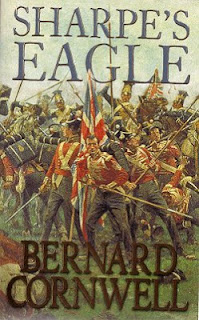We open with Sharpe and his rifle company* being drafted into yet another weird little scheme. An ancient Roman bridge crossing the river Tagus, a bridge that has stood strong for hundreds of years, has to go for strategic reasons, and Sharpe's friend and sort-of-commander, Captain Hogan, is the engineer who's going to do it. All fine and dandy. But the mission comes with certain... accompaniments.
A right upper class twit of a politically connected jerk has raised a brand new regiment back home and dedicated them to the cause in Spain and Portugal, and they're coming along in all their finery and splendor. The upper class twit thinking that it's more important that his soldiers look well than fight well and all, it's a pretty useless regiment but one that, maybe with some seasoning, might do all right if their Colonel, one Sir Henry Simmerson, doesn't get them killed first. Anyway, they're coming along for the bridge blowing party.
But because this is Spain and everything here is a matter of hidalgo honor, so is a fancy Spanish regiment, even shinier and fancier and more useless than the British noobs. "Hell's teeth," one of Sharpe's men observes on the approach of these military fops. "The fairies are on our side."
So, the early mission turns out not to be so straightforward after all. And that's before the French show up. Which shouldn't be a problem, as it's obvious to Sharpe it's a classic calvary vs infantry standoff, wherein no one has sufficient advantage to make it worthwhile to attack. Alas, this is not so obvious to the Colonel or his Spanish counterpart, who, in a scene of prolonged hilarity, pretty much provoke the French into massacre. And lose the regimental colors (the physical embodiment of a regiment's honor and pride the way a Roman legion's eagle was back in the day, and what the French still use for this purpose ca the early 1800s, and now the title of this novel makes all the sense in the world, don't it?) into the bargain.
That's all prologue. It establishes a new enemy for Sharpe in Colonel Simmerson, who needs a scapegoat for his enormous blunder and finds Sir Arthur Wellesley's favorite gotten-up, up-from-the-ranks officer a perfect candidate as much because Sharpe is a protege of Wellesley's as because Sharpe disobeyed an order in the middle of the debacle that was essentially for him and his men to commit suicide and make the French win all the faster (instead, Sharpe rescued one of Simmerson's colors and captured a French cannon, because Sharpe is awesome). When Wellesley promotes Sharpe to Captain and gives him command of a Battalion of Detachments, consisting of odds-and-ends groups like Sharpe's own fragment of a rifle company, and puts the survivors of Simmerson's regiment in that new Battalion, he's just painted the biggest political bullseye ever on Sharpe's back, and Sharpe is, of course, the last guy who'd ever want to be entangled in any politics at all. Especially the kind that can result in his being yanked out of the Peninsular War and deployed to the West Indies, to likely die of a tropical disease within a year of his arrival!
But so there's only one thing Sharpe can do to redeem himself from the results of his badassery: something even more badass, something no one has managed to do in this war: capture a French Eagle.
And of course he'll have to do this in one of the Peninsular War's biggest battles.
With Simmerson and his underlings (including an odious nephew, who is, of course, fighting with Sharpe over, of course, a beautiful woman) in tow.
And even more useless Spaniards mucking things up. Seriously, the Spanish army does not come off well in this novel! When they're not cocking up minor actions being show-offs, they're delaying major actions by oversleeping and letting the French gather up even more forces. And then there's bits like this, describing the aftermath of an ill-planned bout of shooting at some out-of-range Frenchmen:
For a second Sharpe thought the Spanish were cheering their own victory over the innocent grass but suddenly he realised the shouts were not of triumph, but of alarm. They had been scared witless by their own volley, by the thunder of ten thousand muskets, and now they ran for safety. Thousands streamed into the olive trees, throwing away muskets, trampling the fires in their panic, screaming for help, heads up, arms pumping, running from their own noise.I bet Spanish readers hate this book.**
But I, I loved it. I'm in serious danger, folks, between this and my re-read of the Aubrey/Maturin books, of making this as much a Summer of Napoleonic War Stories as a Summer of Jest!
Though I do sometimes wish Sharpe would stop taking justice into his own hands. Dude has almost as much cold blood on them as hot. Not cool, Richard. Not cool. As it were. Um. Please don't hurt me.
*Now a seriously rag-tag bunch of military orphans, whose regiment is back in England and who therefore cannot get new uniforms or boots or gear of any kind, even from the plentiful other fighting recipients of the King's Shilling who are still on the Iberian Peninsula, because no one wants to take on the bureaucratic headaches that would ensue if Sharpe's boys were given kit out of some other regiment's or division's stores.
**But, as Cornwell informs us in his traditional historical afterword, that incident really happened.

No comments:
Post a Comment
Sorry about the CAPTCHA, guys, but without it I was getting 4-5 comment spams an hour.